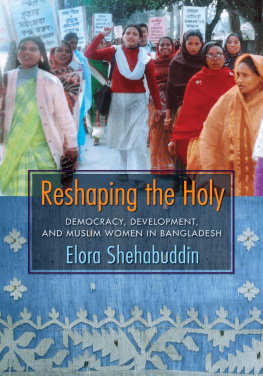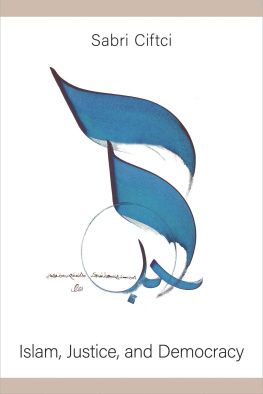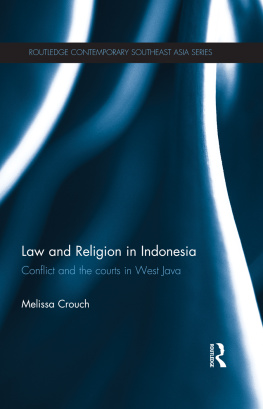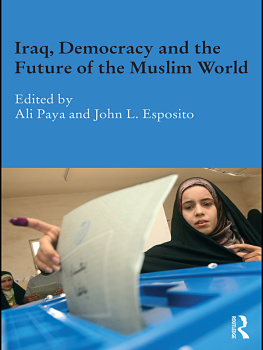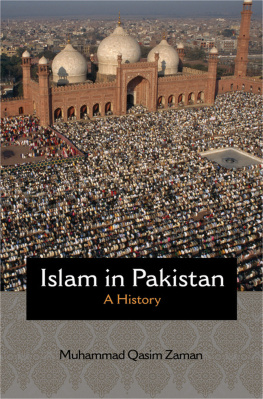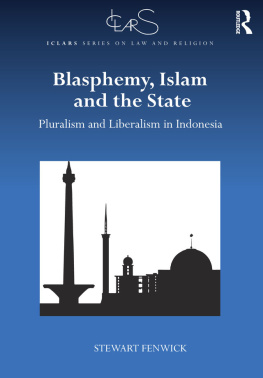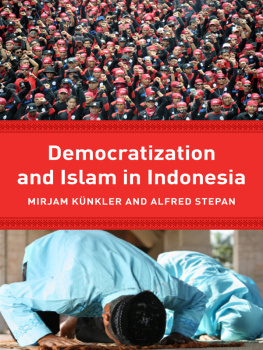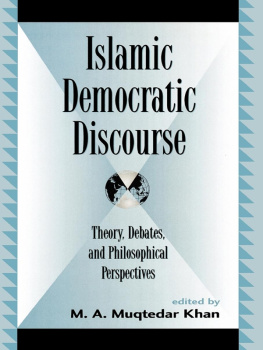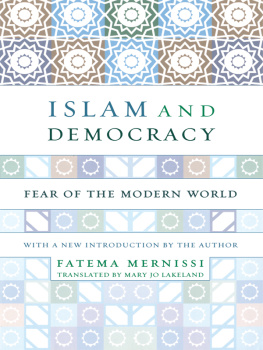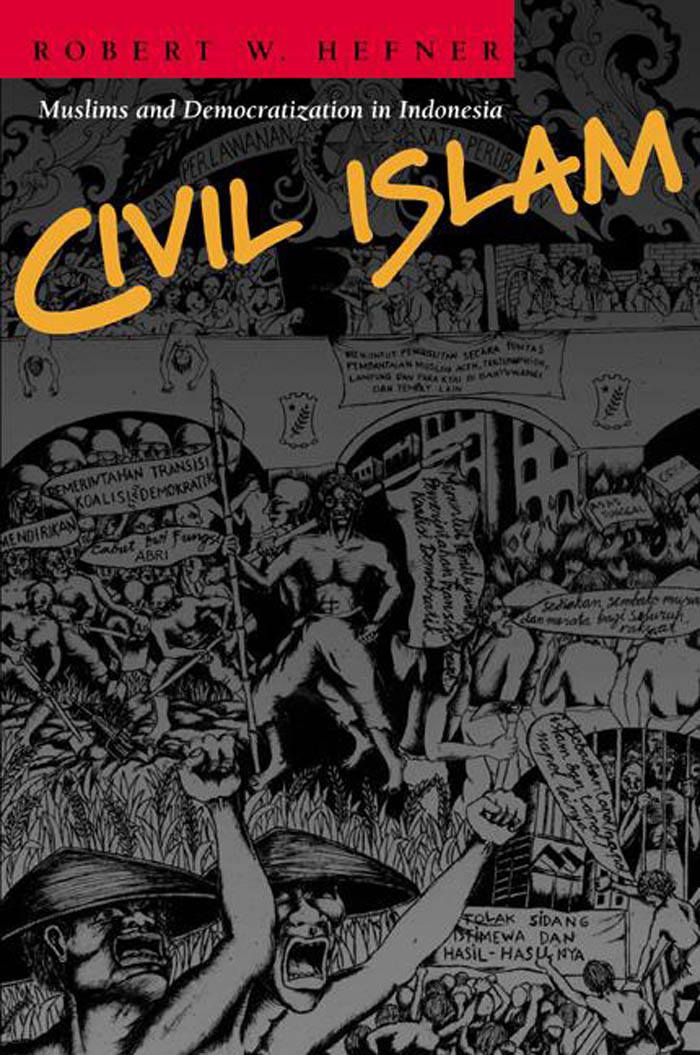CIVIL ISLAM
PRINCETON STUDIES IN MUSLIM POLITICS
Dale F. Eickelman and James Piscatori, Editors
Diane Singerman, Avenues of Participation: Family, Politics, and Networks in Urban Quarters of Cairo
Tone Bringa, Being Muslim the Bosnian Way: Identity and Community in a Central Bosnian Village
Dale F. Eickelman and James Piscatori, Muslim Politics
Bruce B. Lawrence, Shattering the Myth: Islam beyond Violence
Ziba Mir-Hosseini, Islam and Gender: The Religious Debate in Contemporary Iran
Robert W. Hefner, Civil Islam: Muslims and Democratization in Indonesia
CIVIL ISLAM
MUSLIMS AND DEMOCRATIZATION IN INDONESIA
ROBERT W. HEFNER
PRINCETON UNIVERSITY PRESS
PRINCETON AND OXFORD
Copyright 2000 by Princeton University Press
Published by Princeton University Press, 41 William Street,
Princeton, New Jersey 08540
In the United Kingdom: Princeton University Press,
3 Market Place, Woodstock, Oxfordshire, OX20 1SY
All Rights Reserved.
Library of Congress Cataloging-in-Publication Data
Hefner, Robert W., 1952
Civil Islam : Muslims and democratization in Indonesia / Robert W. Hefner.
p. cm. (Princeton studies in Muslim politics)
Includes bibliographical references and index.
ISBN 0-691-05046-5 (cloth : alk. paper) ISBN 0-691-05047-3 (pbk. : alk. paper)
1. Islam and stateIndonesia. 2. Islam and politicsIndonesia. 3. DemocracyReligious aspectsIslam. 4. N.U. (Organization) 5. IndonesiaPolitics and government19661988. 6. IndonesiaPolitics and government1998 I. Title. II. Series.
BP63.I5 H44 2000
322.109598dc21 00-020486
This book has been composed in Berkeley Book
The paper used in this publication meets the minimum requirements of ANSI/NISO Z39.48-1992 (R1997) (Permanence of Paper)
www.pup.princeton.edu
Printed in the United States of America
10 9 8 7 6 5 4 3 2 1
10 9 8 7 6 5 4 3 2 1
(pbk)
CONTENTS
CHAPTER ONE
Democratization in an Age of Religious Revitalization
CHAPTER TWO
Civil Precedence
CHAPTER THREE
Contests of Nation
CHAPTER FOUR
Ambivalent Alliances: Religion and Politics in the Early New Order
CHAPTER FIVE
The Modernist Travail
CHAPTER SIX
Islam Deferred: Regimist Islam and the Struggle for the Middle Class
CHAPTER SEVEN
Uncivil State: Muslims and Violence in Soehartos Fall
CHAPTER EIGHT
Conclusion: Muslim Politics, Global Modernity
FOREWORD
Few Subjects in the Muslim world in the late 1990s commanded the attention of analysts and policy makers as much as Islams compatibility with democracy, and few countries aroused more interest than Indonesia. Revolutionary developments engulfed the worlds largest Muslim state, from the popular unrest that led to the overthrow of President Soeharto after thirty-two years in power to the holding of the first relatively free, multiparty elections since the 1950s to the bloody events in East Timor that brought an unprecedented foreign military intervention to an independent Indonesia. These startling events, along with the unexpected regional economic malaise, excited concern that Indonesia had become the sick man of Asia and even prompted some to wonder whether this archipelago of thousands of islands could survive as an integrated state. Robert Hefners singular contribution is to put this roiling tableau into perspective and to explain the long-term trend, barely visible at times to the international public, of an evolving Muslim politics of pluralism.
The received wisdom that Muslim societies are democracy-resistant owes much, of course, to a revival of nineteenth-century formulations that civilizations and cultures are all-encompassing and determining. Islamic civilization, it is often argued, does not value intermediary institutions between the government and the people, thus precluding the emergence of civil society, and is based on a legal culture of rigidity, thus placing a premium on obedience and social conformity rather than on critical inquiry and individual initiative. Social scientists have added to this pessimistic view by emphasizing the adverse effects of social and economic stratification and especially the weaknesses of the middle classes. While sensitive to the myriad social trends at work, Hefner places the search for democratization in its shifting cultural contexts and stresses that the rhythm of democratic development varies according to specific milieu. More than elections, wealth, and constitutional arrangements, democracy depends, in his view, on a virtuous circle of values and associations that varies in its cultural expressions. Debates over the meaning of Islamic traditions and contestation over Islamic symbols are fully covered in the discussion that follows, but Hefner does not assume that Indonesians inevitably live according to a fixed normative code or that Islamic influences are invariable.
Highlighting the role of Islamic groups like the Nahdlatul Ulama (NU), Masjumi, and the Association of Indonesian Muslim Intellectuals (ICMI), this work argues that current Muslim demands for greater political participation must be seen against a historical background of cultural and social pluralism as well as state violence. Soehartos New Order regime came into existence in 196566 on a wave of civil unrest and killings of an unprecedented scale, and went out in 1998 in a deliberately contrived atmosphere of sectarian and ethnic conflict. In addition to the important economic forces that were at work, a sea of change of growing Muslim self-assertiveness had been occurring. The government, which could not afford, in the long run, to ignore this revivalist sentiment and which sought alternately to harness and divide it, was ultimately undermined by Muslims of varying views and institutional affiliations who joined together in a democratic opposition.
Hefners study puts Indonesia alongside post-Franco Spain or postcommunist Eastern Europe as a key case study of democratic transition. It persuasively concludes that although democracies are not everywhere uniform and their development is incremental, the linkages forged between state and civil society are decisive for the success of democratizaton. Where there are well-established roots of pluralism in Indonesia and a depth of civil-democratic conviction, the existence of a civil society is not sufficient for a viable democracy to develop; the state, too, must become civil or, to use the authors word, civilized. Contrary to what some have suggested, state and society are not mutually exclusive but must work together in tandem. A strong state is not a problem itself as long as it is committed to basic rules of tolerance and adheres to fundamental limitations. Institutions are doubtless significant in this process, but the social imaginary, in Charles Taylors phrase, is vital. Simply put, the political and moral imperative of democracy depends on how one thinks about the state or, broadly, its cultural underpinnings.
As Professor Hefner shows, the Indonesian public sphere has inescapably been shaped by forces that have also been present in other Muslim societies. Abetted, in significant part, by a literacy rate of nearly 90 percent and the expansion of the public educational sector since 1965, Indonesians have acquired the means to develop and articulate alternative politicaland Islamic visions. This process of formalization, or what we call objectification, of Islam is a contributor to the fragmentation of authority at the same time as it is a marker of intellectual creativity. Although the government labored to coerce all mass organizations to accept the official, nonsectarian ideology of


